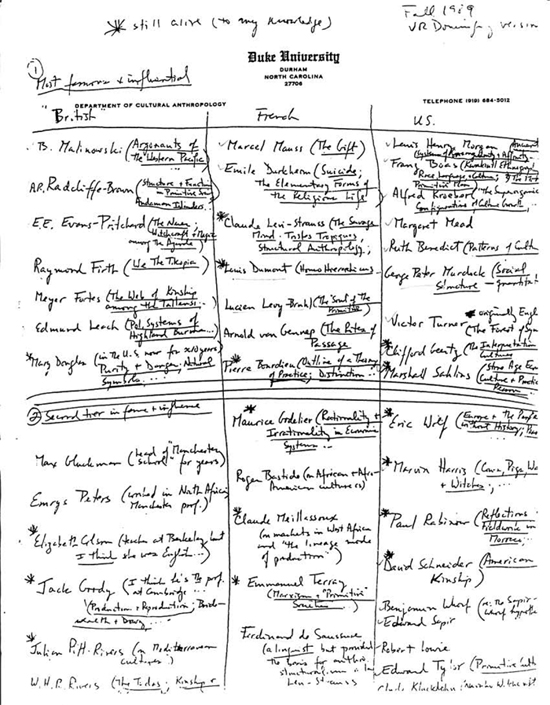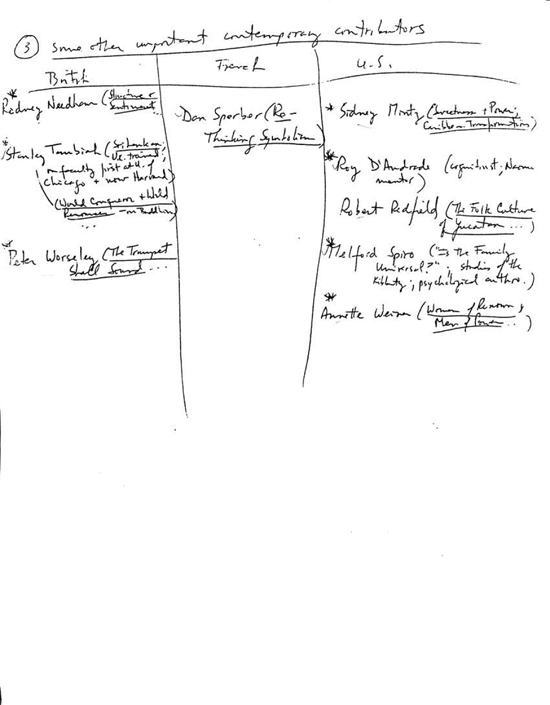Today and tomorrow, I’m taking part in a workshop which aims to get the basic masonwork and scaffolding in place for a new book about culture. Don’t we have too many of those books already? Yes. Well then, do we need another one? Afraid so.
My colleague Øivind Fuglerud, who has written – among other things – Life on the Outside, a study of Somali refugees and long-distance nationalism, took the initiative for the book some time ago, invited an assortment of social scientists he trusted and respected, and wrote a fairly comprehensive outline. More recently, having changed jobs (he no longer directs research on minority issues), he generously invited me to co-edit the book with him.
Specifically, the book is going to deal critically with the uses of the culture term in the debate (academic and non-academic) about refugees and immigrants in Norway. Virtually every West European country has its debates about immigration and minorities, and they sometimes ricochet between countries. A topic raised in France may turn up in Sweden a month or two later, resurfacing in Germany after half a year. In recent years, the public attention in many countries has typically focused on hijabs, enforced marriages, honour killings, low educational achievements among certain immigrant groups and female circumcision. Not exactly uplifting.
Academic research on immigrants in Europe can, broadly, be divided into three phases. In the 1970s and 1980s, the emphasis was largely sociological, focusing on the labour market, discrimination and the quest for equality. From the late 1980s to around 2000, anthropological perspectives dominated, and there was an enormous interest in cultural dimensions. In the last few years, there has been more open disagreement among researchers than before; for example, researchers unsympathetic to immigration have become outspoken and visible.
What we want to say in the book, which will have around a dozen contributors, is that the culture concept has to be retained in the academic vocabulary. Yes, it is being exploited strategically for ideological or political ends, it is fuzzy, it has dubious origins in nationalism and relativism (as well as having underpinned oppressive power structures like the apartheid regime in South Africa), and it never ceases to produce misleading and dangerous essentialisms.
Yet experience tells us that we live in slightly different worlds and that these worlds sometimes vary along the lines of language, ethnic identity or religion – and that cultural differences can be identified quite easily within a these groups as well. Anthropologists have said much about this, in Norway liike elsewhere. We have also pointed out that culture does not explain class diifferences, and that social problems usually do not have cultural causes. We have spoken about hybridity and creolisation, stressed the cultural discontinuities within the majority (fundamentalist Christians are, in their way, just as exotic as conservative Muslims), and described cultural changes within immigrant groups. (Some Norwegian Pakistanis are so Norwegianised that you have to see them in Pakistan to understand it. In Norway, only their differences are generally seen.) There have been lively controversies over cultural rights, mother-tongue training in schools, the role of religion in Norwegian schools and many other issues.
This has created widespread confusion. As Øivind pointed out at the workshop earlier today, college students no longer have a clue as to what to make of the term culture. It appears to be everything and its opposite. A clarifying book is needed. But how?
I think we should try to be faithful to that old ethnographic virtue of crawling on all fours, our noses touching the ground. (The sociologists, psychologist and geographer in the team may not agree, I haven’t asked them yet.) But one needs to stay close to the cases in order to discover that one cannot generalise about cultural differences between particular groups, or about the role of culture in general as a descriptive or explanatory category.
The Parisian riots provide a good case. Some commentators have tried to link the riots to religious revitalisation and militant Islamism in the Arab-speaking world. Yet, others – including the anthropologist André Iteanu, who has done research in these areas for years – point out that the riots have social causes, not cultural ones: The people living in these parts of Paris have no metro, few buses, hardly any libraries – and the majority have no work. Deprived and poor people have rioted in Paris several times before. It has nothing to do with their being Muslim and everything to do with their being socially excluded. Conclusion: Leave culture out of this matter.
Another case, less familiar to most of the readers and less easy to disentangle, is the murder of Fadime Sahindal in Uppsala, Sweden a few years back. Fadime, the daughter of a Kurdish immigrant, was killed by her father, who saw her insistence to live ‘like any other Swede’ as intolerable and unbearable for the family’s honour. In the Swedish public sphere, it had by now been noticed that the people who invoked cultural explanations tended to be right-wing and bigoted. Thus, the official view, voiced by opinion leaders in Swedish society, was that Fadime was the victim of patriarchy and a deranged man.
After a while, the Uppsala anthropologist Mikael Kurkiala wrote an article where he argued that culture obviously had something to do with this: Although ‘Kurdish culture’ did not in any way determine the actions of Fadime’s father, his Kurdish universe offered cultural scripts, one of which consisted in killing a daughter to restore honour. Unaccustomed to the brutality of public controversy, Kurkiala was taken somewhat aback when respected liberal Swedes literally pounced on him, claiming him as a useful idiot for the extreme right wing. Kurkiala’s conclusion, which has recently been developed in a beautifully written book in Swedish, where he discusses ways of handling difference (he draws extensively on his fieldwork among Lakota here), was that if it is impossible even to mention cultural factors as dimensions of society and as ‘models of and models for’, then we have relinquished any attempt to understand our world. Conclusion: Bring culture back in.
So what is my position? I have considerable sympathy with some of the texts from the last couple of decades that have tried to exorcise the evil spirit of culture from anthropology. The have forced us to reach for higher levels of precision. Yet in spite of all the obvious objections and a few less obvious ones, we can’t do without it. To me, the proposition to use culture as a verb (Brian Street) makes sense. It varies within any group and has no clear boundaries, it is relational, it behaves oddly in an era of transnational communication, and it is more of a fluid than a solid. But at the end of the day, Fadime’s father killed his daughter in a world that was originally created in Kurdistan, not in Sweden. Keeping close to the cases is our only hope if the goal is to prevent further confusion. Maybe even some good writing can come out of it.

